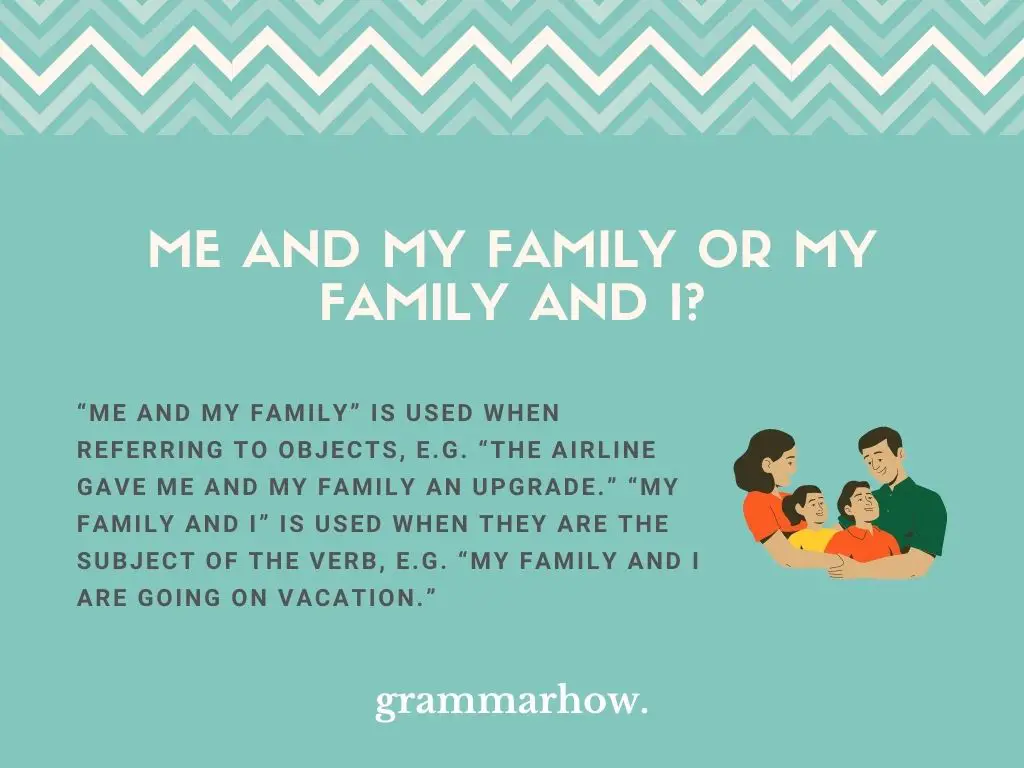Selecting the correct pronoun from “me” and “I” is difficult, and which to choose depends on who is “doing” the verb in the sentence.
This page explains both terms in detail and shows how to use them in a sentence.
Me and My Family or My Family and I?
“Me and my family” is used when referring to objects, e.g. “The airline gave me and my family an upgrade.” “My family and I” is used when they are the subject of the verb, e.g. “My family and I are going on vacation.”

The pronoun “I” is always a subject pronoun, which means that the “I” must be the actor of the verb.
- My family and I are going to Barbados next week.
- My family and I often eat together at the weekends.
In contrast, the pronoun “me” is an object pronoun, so it must be the receiver of the verb.
- The receptionist told my family and me we didn’t have a reservation.
- The club gave my family and me free tickets for this week’s game.
Therefore, when deciding between “I” and “me”, you only need to identify “who is doing the verb?” and you will know which one to use.
Also, the phrase “me and my family” is usually in reverse order as “my family and me” because the speaker should always come last when mentioning other parties.
Furthermore, when the sentence is in “passive voice”, and the focus is on the “indirect object”, i.e., the person(s) receiving the action, then the pronoun changes to “I.”
- My family and I were given free tickets to the game
- The ticket to the game was given to my family and me.
Me and My Family
The term “me and my family” is correct when the two parties are the object of the sentence, i.e. when they receive the action of the verb.
It is better to reverse the term so that it reads “my family and me” because when a speaker mentions other people, the speaker should always come last. Nonetheless, it is common for people to use the term in the order “me and my family.”
Here are some example sentences:
- Salespeople call me and my family at least five times per day.
- The tickets were given to me and my family, but we couldn’t find them anywhere.
- The security guard shouted at me and my family because he thought we had jumped the line.
In passive sentences, if the focus is on the “indirect object”, i.e. the person(s) receiving the verb, then the pronoun reverts to “I.”
As shown in these examples:
- The security guard told me and my family to show our tickets.
- My family and I were told to show our tickets by the security guard.
- The police officer issued a fine to me and my family for driving too fast.
My Family and I
The term “my family and I” is used when the family and the speaker are both the subjects of the sentence, i.e. they are both doing the verb in the sentence.
The term “my family and I” is never reversed in the same way that the term “me and my family” is often reversed.
Here are some examples of “my family and I” in a sentence:
- My family and I always argue around Christmas time.
- My family and I are going on a cruise around the Caribbean.
- My family and I made the most of the buffet and ate three plates of food each.
Please note that in “passive voice” sentences, when the “receiver” or “indirect object” is mentioned first, you should revert to using “I.”
For example:
- The airline staff gave my family and me our boarding passes.
- My family and I were given boarding passes by the airline staff.
- The boarding passes were given to my family and me by the airline staff.
My Family and Me
The term “my family and me” is used when the speaker and the family are both objects of the sentence.
It is often reversed to “me and my family”. However, the “correct” way would be “my family and me” because the speaker should always come last when mentioning other parties.
Here are some examples of how “my family and me” looks in a sentence:
- The staff told my family and me that we wouldn’t have access to the room until 1 pm.
- The food hamper was presented to my family and me for all the support we had offered the group.
- The police showed my family and me CCTV footage of the robbery to see if we recognized the thieves.
Please note that in “passive voice” when the “indirect object” or “receiver” of the verb appears first, you should use “I” instead of “me.”
For example:
- The hotel staff gave my family and me a coupon for discounts on food.
- A coupon was given to my family and me by the hotel staff for discounts on food.
- My family and I were given a coupon by the hotel staff for discounts on food.
Conclusion
The term “my family and I” is correct and should be used when the two parties are the subject of the sentence.
In contrast, “my family and me” or “me and my family” is used when both parties are the object of the sentence, which means they are receiving the action of the verb.
However, in passive voice sentences, when the “indirect object” or “receiver” of the verb appears first in the sentence, the term “my family and I” should be used.

Martin holds a Master’s degree in Finance and International Business. He has six years of experience in professional communication with clients, executives, and colleagues. Furthermore, he has teaching experience from Aarhus University. Martin has been featured as an expert in communication and teaching on Forbes and Shopify. Read more about Martin here.
